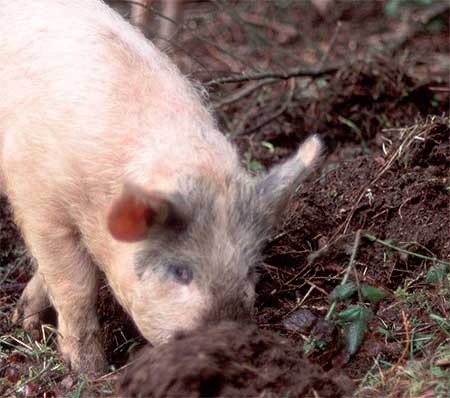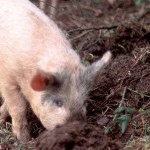Pigaerator Compost
When’s the last time you bought a car or a piece of “farm machinery” that doubled and quadrupled in value as it got older? Imagine also if your “farm machinery” did all the work for you – for free? Joel Salatin from Polyface Farms does just that using his pigs to move stuff around. Sounds crazy right?
Recently in association with Regen Agriculture in Australia we filmed an entire days workshop with American “lunatic farmer” Joel Salatin who devised a unique way of getting his farm animals to become his co-workers – his “co-conspirators” as he likes to call them to do just that for free.
Joel has figured out a way to get his pigs to turn cow poop into compost by encouraging them to do what they love doing best – rooting around in the muck and strategically directing them to aerate his straw mulch and turn it into valuable compost.
Joel says the average cow will excrete around 50 lbs or just over 22 kilos of poop per day. When you multiply that number by a large herd of cattle – it becomes a serious amount of fertilizer. Disposing of manure can become quite a chore involving heavy machinery. But what if you apply a little creative thinking to the problem? Is it possible to get a farm animal like pigs to do that work for you?
Good compost needs a large ratio of carbon to nitrogen. 25:1 or even 30:1 of carbon to nitrogen is needed to keep the volume of compost intact and prevent it from “burning up” and decreasing in size. Microbes do the real work of creating compost but they function best when the compost is turned frequently and enough air is tumbled into the mix. Turning compost over is hard work. This is where Joel’s pigs come into the equation.
[swfobj src=”http://www.ecofilms.com.au/wp-content/uploads/2011/08/pigaerator1.swf” width=”500″ height=”360″]
Joel throws in a little corn into the mix to encourage his pigs to hunt for food amongst all the mulch. The pigs churn over the mulch speeding up the decaying of the compostable material. Joel says his “pigaerator pork” system uses no petroleum, no depreciating infrustructure, he’s in fact up-appreciating his assets because he buys his piglets at $50 each and sells them weeks later for $400.
Thats how I like to buy equipment!” smiles Joel. “You don’t have to pay them a minimum wage.”
There are no retirement benefits for his pigs.
“When you’re done with them – you can eat them!” he says.
He also gets good compost made by pigs into the bargain.
Joel explains his system in this YouTube clip.








Recent Comments